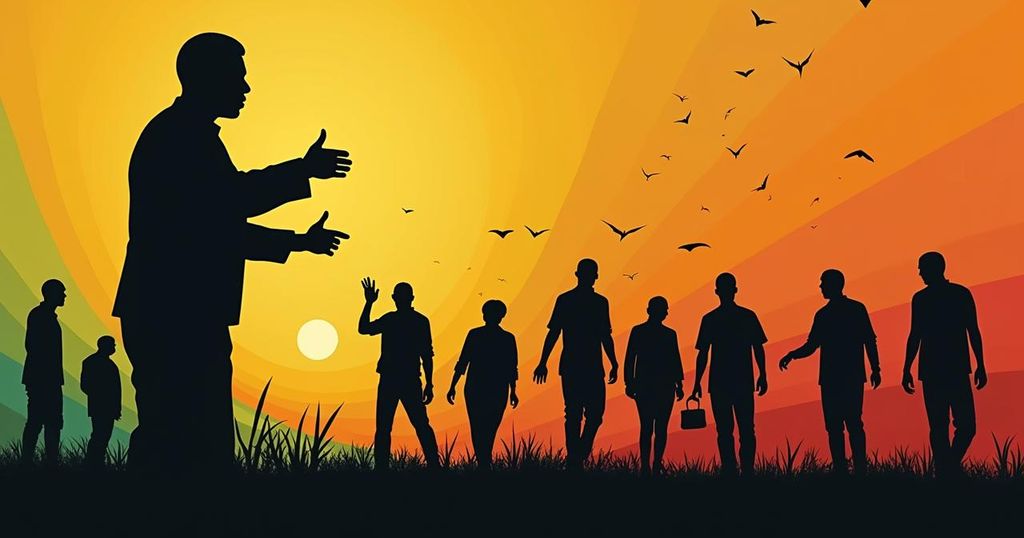Mozambique’s Upcoming Presidential Election: Key Insights and Implications
Mozambique is set to elect a new president on Wednesday, following President Filipe Nyusi’s tenure. Approximately 17 million voters are registered, with candidates from the ruling Frelimo party and various opposition figures. Key issues include a jihadist insurgency, food shortages, and economic instability, compounded by past allegations of electoral fraud. Counting will begin immediately after voting, with results expected in 15 days.
Mozambicans are poised to vote on Wednesday in a crucial election to select a successor to President Filipe Nyusi, who has served two terms in office. Approximately 17 million voters from a populace of 31 million are registered to participate in this election, which will also determine 250 members of parliament and provincial assemblies. While expectations lean toward the ruling Front for the Liberation of Mozambique (Frelimo) maintaining control, the political landscape features at least four candidates vying for change amid ongoing challenges, including a persistent jihadist insurgency in the northern regions and adverse climate conditions affecting the lengthy coastline. The security crisis has displaced over 1.3 million people and compounded food shortages, significantly impacting citizens’ lives. A previous electoral process within Mozambique last year faced accusations of vote rigging, inciting violent protests in the capital, Maputo, yet similar concerns appear somewhat subdued this election cycle. Ruling party nominee David Chapo, a 47-year-old former provincial governor from Inhambane, is expected to face notable challenges from independent candidate Venacio Mondlane, aged 50. Mondlane, a banking executive and forestry engineer, has campaigned under the banner “Save Mozambique, this country’s ours” and has experienced significant support, particularly from the dissident-driven Optimistic Party for the Development of Mozambique (Podemos). Lutero Simango represents the Democratic Movement of Mozambique, established by members who splintered from the former rebel group and opposition party, Mozambique National Resistance (Renamo). The party aims to resonate with youth through its focus on job creation and social equity. Renamo’s candidate, Ossufo Momade, has taken up the leadership role following the demise of Afonso Dhlakama. Key issues confronting Mozambique include ongoing assaults by an Islamic State-affiliated group in Cabo Delgado since 2017, leading to dire humanitarian conditions and displacements. Candidates have promised to tackle developmental issues heightened by this conflict, which led to the suspension of a vital gas project by TotalEnergies. Coupled with high unemployment and hunger rates exacerbated by severe drought attributed to El Niño, the socio-economic fabric of the country is under strain. The ruling Frelimo has also been beleaguered by corruption scandals, particularly the “tuna bond” scandal involving illicit deals that resulted in hidden governmental debts amounting to $2 billion, disrupting international financial support. Following a single day of voting, counting will commence immediately, and results will emerge progressively. The National Election Commission will provide official results within 15 days, which will then require validation by the Constitutional Council. This election exemplifies a critical juncture for Mozambique, as the nation grapples with multifaceted challenges on its path towards stability and development.
Mozambique is preparing for a presidential election that aims to replace President Filipe Nyusi, who has been in power for two terms. Set against a backdrop of a humanitarian crisis due to a jihadist insurgency and severe climate impacts, the election holds significant implications for the country’s governance and future stability. The ruling party, Frelimo, has faced allegations of corruption and electoral fraud, which casts a shadow over the democratic process in Mozambique. Voter turnout and the outcomes of this election are vital for addressing the urgent needs of a population affected by violence and food insecurity.
In conclusion, Mozambique’s upcoming presidential election represents a pivotal moment for the nation as it confronts significant challenges from an insurgency, climate change, and lingering socio-economic issues. With a variety of candidates presenting differing visions for the country’s future, the election’s outcome will be instrumental in shaping Mozambique’s trajectory as it seeks stability and development.
Original Source: apnews.com




Post Comment